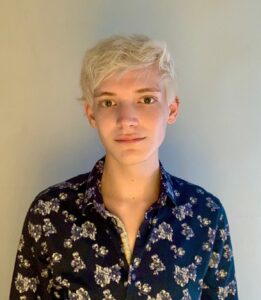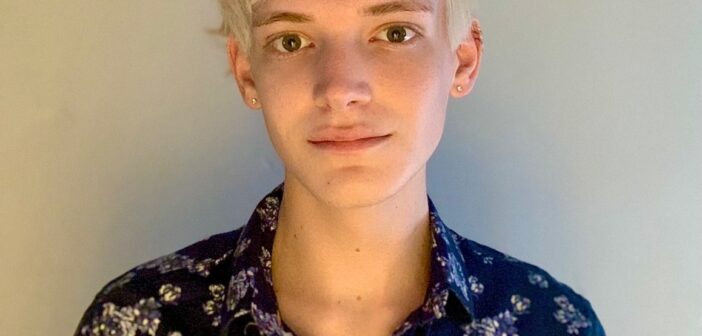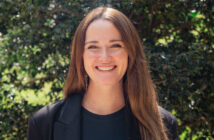
Alex Cubbage, ’24
On Alex Cubbage’s first weekend as a Lehigh student, he felt so uncomfortable that he hardly left his dorm room.
Within half an hour of leaving his residence hall for the first time, Cubbage, ‘24, was called a “faggot” by a group of male students.
In October 2020, Lehigh was named one of the “Best of The Best Colleges and Universities for LGBTQ students” by Campus Pride. However, Cubbage, who identifies as gay, said he doesn’t feel comfortable on campus at all.
Over the next few months, this series of columns will examine what it’s really like to be an LGBTQ+ member within the Lehigh community.
“I tone myself down a lot,” Cubbage said. “I watch how I dress. I watch how I speak. I watch how I act. I am so very aware of all my mannerisms and how I present myself to others because I don’t want to be judged.”
Transitioning to college is difficult—enrolling in tough classes, interacting with new people and, for many students, learning how to live alone for the first time. A dorm room should be an escape from all the difficulty, where students can relax and be themselves. However, this was not the case for Cubbage.
Cubbage said he felt like his presence in his freshman dorm created tension that left him feeling unwanted.
“You can tell when people would rather not have you there,” he said.
This situation caused Cubbage to move off campus after his first semester, which made finding his place on campus even more difficult.
Cubbage didn’t go to the dining hall more than five or six times during the fall semester of his freshman year because he didn’t feel comfortable or safe.
Coming from a conservative area in Florida, Cubbage said he thought a college campus would be a more accepting environment, but that hasn’t been his experience.
When he was applying to colleges, Cubbage was looking for a school that would let him double major in Computer Science and Business. Lehigh’s Integrated Business and Engineering (IBE) program felt like a perfect fit.
Cubbage considered transferring to another institution because of the cultural experience at Lehigh.
“I don’t hate Lehigh necessarily,” he said. “I just feel so profoundly unwanted on campus.”
Cubbage said that the Pride Center, Spectrum and oSTEM are places where he can be himself.
Spectrum is a student organization dedicated to providing a safe environment for Lehigh LGBTQ+ students and their allies. oSTEM (Out in Science, Technology, Engineering and Mathematics) is an organization that provides services and support for LGBTQ+ students in STEM.
However, Cubbage, who entered college mid-pandemic, said it’s been hard to use these resources due to COVID-19 restrictions.
Cubbage wants Lehigh to admit that it has a problem with the treatment of LGBTQ+ students on campus.
“I don’t know a single LGBTQ person on campus who hasn’t had a bad experience,” he said. “Every single person I’ve talked to has a story.”
Cubbage said he doesn’t think all people at Lehigh are intentionally homophobic or transphobic, but believes there is not enough education around LGBTQ+ issues.
“I feel like with the proper education and realizing how miserable an experience it is being LGBTQ on campus, I do think that would have some impact,” he said. “I do think, fundamentally, people have empathy.”
By prioritizing education around LGBTQ+ issues on campus, Cubbage thinks Lehigh could signal that LGBTQ+ students are cared about.
At this point in his Lehigh experience, Cubbage said he feels like he just has to make it through to graduation, move on and consider his college years a sunk cost.
It is unrealistic to expect college to be the best four years of every student’s life, but shouldn’t Lehigh do everything in its power to support the members of its community?
Lehigh’s Principles of an Equitable Community reads “We confront and reject discrimination in all its forms, including that based on age, color, disability, gender identity, genetic information, marital status, national or ethnic origin, political beliefs, race, religion, sex, sexual orientation, socio-economics, veteran status, or any differences that have been excuses for misunderstanding, dissension, or hatred.”
Until the university addresses the homophobic treatment within its community, Lehigh students will continue to feel unsafe.






Comment policy
Comments posted to The Brown and White website are reviewed by a moderator before being approved. Incendiary speech or harassing language, including comments targeted at individuals, may be deemed unacceptable and not published. Spam and other soliciting will also be declined.
The Brown and White also reserves the right to not publish entirely anonymous comments.
7 Comments
There are many QTPOC members of our campus community who put in countless hours of work to make Lehigh a safe place for all members of the LGBTQIA+ community. I hope this series highlights their work and sacrifices for Lehigh & doesn’t exclusively focus on the white queer experience at a PWI.
One of the rampant issues within lehigh is that it is only prioritizing white voices and in this case it is a white cisgender gay man speaking for an entire community at Lehigh. The complexities faced by QTPOC (queer trans people of color) will go unheard and unnoticed for longer until those voices are actively sought out. He cannot speak for an entire group that is continuously marginalized. An important question to ask is where, if at all, do we see an outlet for QTPOC voices, not only on Lehigh’s campus, but in the microcosm of the LGBTQ+ spaces such as Spectrum. Lehigh is a PWI and it is inappropriate to think that the queer communities are immune to the institutionalized systems of oppression.
hahaha, this guy takes a risk to go out on a limb and put himself out there. The entire article is about how he feels unwelcome and you feel the need to invalidate his opinion and make it clear that he is also not welcome and appreciated by a portion of the LGBTQ+ community because he is white?
The callousness and cruelty exhibited in some these comments is pretty embarrassing to be honest.
booo tomato tomato tomato
I’m a white homophobic republican catholic. It was helpful for me to read his perspective of how it feels to be him on campus. I’m not sure I would of started to read the article if the picture didn’t look like me. It helps me to be aware that not only “minority races” experience this hostility.
As a White gay student, I have also had similar experiences around Lehigh’s campus. But I have to recognize that my experiences on this campus were also impacted by my whiteness. And sadly, my whiteness comes at the expense of BIPOC people on this campus.
The sad fact is that many of Lehigh’s queer resources are inherently white resources. Proof of this is how the first article in a column documenting the queer experience is centered around a white man. And Spectrum, the club you mentioned, is run entirely by white gay men. In fact, oSTEM was founded to counteract the whiteness of Spectrum. Our sexuality does not define our public image nearly as much as our race. And while I admit that my first year was particularly gruesome, it was nowhere near as bad as that of my POC friends.
The voices of white queer students should not be prioritized over the myriad of people who lie at the intersection of race, gender, sexuality, and socioeconomic status. The emphasis on the white experience being the default, thus far in the column, is another example of how the white gaze has dominated our campus environment. There should be critical attention paid to Lehigh’s lip service to QTPOC students and increased pressure on Lehigh administrators to take meaningful action that we students have consistently demanded; I hope the following articles in this series highlight more than the white gay Lehigh experience.
Your view doesn’t match mine but your explanation helps me to understand and appreciate it, from someone in the environment. Sometimes I think LQBTQ+ youth help groups like WingSpan where I grew up in Arizona, unintentionally seem predominately white participants in the local papers and events because it’s culturally riskier for POC members to have their family members and peers “find out” about them. I wonder what others think? Thank you